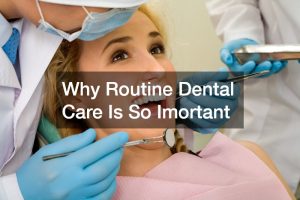
Maintaining good oral health is crucial for overall well-being and confidence. A healthy smile not only enhances your appearance but also prevents numerous dental issues that can lead to more serious health problems. Routine dental care, which includes regular check-ups, cleanings, and following good oral hygiene practices at home, is essential in ensuring that your teeth and gums remain healthy. This article discusses various aspects of dental care, including the prevention of cavities, early detection of dental issues, gum protection, and ways to achieve stronger-looking teeth. We will also explore the benefits of dental procedures like braces, dental crowns, Invisalign, and dental implants. Moreover, we’ll discuss the importance of addressing bad breath, improving oral habits, and the role of orthodontists, local oral surgeons, and cosmetic dentistry in maintaining excellent oral health.
Preventing Cavities

Preventing cavities is one of the primary goals of routine dental care. Cavities occur when the enamel on your teeth is eroded by acid, allowing bacteria to create holes in the tooth’s surface. One way to protect against cavities is through the use of dental crowns. A dental crown is a cap placed over a tooth to restore its shape, strength, and appearance. Crowns are especially useful for teeth that have been weakened by decay or have undergone large fillings.
Routine dental care involves regular visits to the dentist for cleanings and examinations. These check-ups help identify early signs of tooth decay and other dental issues, allowing for prompt treatment. During a dental visit, the dentist will remove plaque and tartar build-up, which are major contributors to cavities. Additionally, fluoride treatments and dental sealants may be recommended to further protect teeth from decay.
In addition to professional dental care, maintaining good oral hygiene practices at home is essential. Brushing your teeth twice a day with fluoride toothpaste, flossing daily, and using an antibacterial mouthwash can significantly reduce the risk of cavities. A balanced diet low in sugary snacks and drinks also helps keep your teeth healthy. By combining routine dental care with good oral hygiene habits, you can effectively prevent cavities and enjoy a healthy smile.
Early Detection of Dental Issues
Early detection of dental issues is crucial for effective treatment and preventing further complications. Regular dental check-ups allow the dentist to identify problems such as tooth decay, gum disease, and misalignment at an early stage. For instance, orthodontists specialize in diagnosing and treating misaligned teeth and jaws. Early detection of misalignment issues can lead to timely intervention with braces or other orthodontic treatments, resulting in better outcomes.
Braces are commonly used to correct crooked or crowded teeth, spacing issues, and bite problems. Early detection of these issues during routine dental care appointments enables the dentist to refer you to an orthodontist for evaluation. Orthodontic treatment not only improves the appearance of your smile but also enhances oral function and health. Properly aligned teeth are easier to clean, reducing the risk of cavities and gum disease.
Routine dental care also includes regular X-rays, which can reveal hidden dental problems that are not visible during a regular examination. These imaging techniques help detect early signs of tooth decay between teeth, impacted teeth, and other abnormalities. Early intervention can prevent the progression of dental issues and save you from more extensive and costly treatments in the future. By prioritizing routine dental care and addressing dental problems early, you can maintain a healthy and beautiful smile.
Protect Your Gums
Protecting your gums is a vital aspect of overall oral health. Gum disease, also known as periodontal disease, is a common condition that can lead to tooth loss and other serious health issues if left untreated. Routine dental care plays a significant role in preventing and managing gum disease. During dental visits, the dentist will examine your gums for signs of inflammation, bleeding, or recession, and provide appropriate treatment if necessary.
Early stages of gum disease, such as gingivitis, can be reversed with proper oral hygiene and professional cleanings. Regular brushing and flossing, along with routine dental care, help remove plaque and bacteria that cause gum disease. If left untreated, gingivitis can progress to periodontitis, a more severe form of gum disease that can damage the supporting structures of the teeth. Periodontitis requires more intensive treatment, including deep cleaning, medication, and possibly surgery.
In addition to professional dental care, adopting healthy habits at home is essential for gum health. Quit smoking, as it is a major risk factor for gum disease. Following a balanced diet rich in vitamins and minerals, especially vitamin C, helps maintain healthy gums. By prioritizing routine dental care and making positive lifestyle choices, you can protect your gums and enjoy a healthier smile.
Stronger Looking Teeth

Achieving stronger looking teeth is not just about aesthetics but also about maintaining the integrity and functionality of your teeth. Routine dental care plays a crucial role in keeping your teeth strong and healthy. Cosmetic dentists specialize in enhancing the appearance of your teeth while ensuring their strength and durability. They offer various treatments such as bonding, veneers, and crowns to address issues like discoloration, chips, and gaps.
Regular dental visits allow the dentist to assess the condition of your teeth and recommend appropriate treatments to strengthen them. For example, fluoride treatments can help remineralize and strengthen enamel, making teeth more resistant to decay. If a tooth is damaged or weakened, a dental crown can restore its strength and appearance, providing long-lasting protection.
In addition to professional treatments, maintaining good oral hygiene habits at home is essential for keeping your teeth strong. Brushing with fluoride toothpaste, flossing daily, and avoiding sugary foods and drinks can significantly reduce the risk of tooth decay and erosion. By combining routine dental care with proper oral hygiene and seeking help from a cosmetic dentist when needed, you can achieve and maintain stronger looking teeth.
Dental Implant Procedures
Dental implant procedures are a popular solution for replacing missing teeth and restoring the function and appearance of your smile. Implants are artificial tooth roots made of titanium that are surgically placed into the jawbone. Over time, the implant fuses with the bone, providing a strong and stable foundation for a replacement tooth. Routine dental care is essential before, during, and after the implant process to ensure the best outcomes.
Before undergoing dental implant procedures, a thorough examination and consultation with a dentist are necessary to determine if you are a suitable candidate. This includes assessing your oral health, bone density, and overall health. Routine dental care helps maintain the health of your remaining teeth and gums, which is crucial for the success of dental implants. Your dentist may recommend scaling and root planing to ensure your gums are healthy before the implant surgery.
After the implant procedure, routine dental care is crucial for the long-term success of the implant. Regular check-ups and cleanings help monitor the health of the implant and surrounding tissues. Proper oral hygiene, including brushing, flossing, and using an antibacterial mouthwash, ensures that the implant remains free of plaque and bacteria. By following your dentist’s recommendations and maintaining routine dental care, you can enjoy the benefits of dental implants for many years.
Building a Relationship With Your Dentist
Visiting a cosmetic dentists office can significantly enhance the appearance of your smile and boost your confidence. Cosmetic dentists specialize in various procedures that improve the aesthetics of your teeth, such as teeth whitening, veneers, and bonding. Routine dental care is essential before and after cosmetic procedures to ensure the health and longevity of your results.
Before undergoing any cosmetic treatments, a comprehensive examination is necessary to assess the overall health of your teeth and gums. Any underlying dental issues, such as cavities or gum disease, must be addressed before cosmetic procedures can be performed. Routine dental care, including regular check-ups and cleanings, helps maintain the health of your teeth and gums, providing a solid foundation for cosmetic enhancements.
After receiving cosmetic treatments, it is essential to continue with routine dental care to preserve your new smile. Regular dental visits allow the dentist to monitor the condition of your cosmetic work and ensure that your oral health remains in good shape. Maintaining good oral hygiene habits, such as brushing and flossing daily, and avoiding habits like smoking or consuming staining foods and drinks, helps keep your smile beautiful and healthy.
Saving Money In the Long Run

Investing in routine dental care can save you money in the long run by preventing major dental issues that require expensive treatments. Early detection and intervention of dental problems can prevent the need for more extensive procedures down the road. For example, addressing a small cavity with a filling is much less costly than treating a severely decayed tooth that requires a root canal or extraction.
Invisalign is a modern orthodontic treatment that can save you money compared to traditional braces. Invisalign aligners are clear, removable, and require fewer dental visits for adjustments. Routine dental care is essential during Invisalign treatment to monitor progress and ensure that your teeth and gums remain healthy. Proper oral hygiene and regular check-ups help prevent complications and ensure a successful outcome.
Preventive care, such as fluoride treatments and dental sealants, can also save money by reducing the risk of cavities and other dental issues. Investing in routine dental care and maintaining good oral hygiene habits can prevent the need for costly restorative procedures. By prioritizing preventive care and addressing dental issues early, you can save money and maintain a healthy smile.
Addressing Bad Breath
Addressing bad breath, or halitosis, is essential for maintaining a fresh and healthy mouth. Bad breath can be caused by various factors, including poor oral hygiene, gum disease, dry mouth, and certain medical conditions. Routine dental care plays a crucial role in identifying and addressing the underlying causes of bad breath, ensuring that your mouth remains fresh and healthy.
During a routine dental visit, the dentist can identify any issues that may be contributing to bad breath, such as cavities, gum disease, or infections. By addressing these issues promptly, you can eliminate the source of bad breath and improve your oral health. Cosmetic dentistry treatments, such as bonding and veneers, can also help address bad breath by restoring damaged teeth and improving overall oral hygiene.
Maintaining good oral hygiene habits is essential for preventing bad breath. Brushing your teeth twice a day, flossing daily, and using an antibacterial mouthwash can help remove food particles and bacteria that cause bad breath. Staying hydrated, avoiding smoking, and regularly visiting the dentist for routine dental care can significantly reduce the risk of halitosis and keep your mouth fresh and clean.
Improve Oral Habits
Improving oral habits is essential for maintaining a healthy mouth and preventing dental issues. Routine dental care provides the guidance and support needed to develop and maintain good oral hygiene practices. Dentists and local oral surgeons offer valuable advice on brushing techniques, flossing, and dietary choices that promote oral health.
Regular dental visits help reinforce the importance of good oral habits. During these appointments, the dentist can provide personalized recommendations based on your oral health status and identify areas where you may need to improve. For example, if you are prone to plaque build-up, the dentist may suggest more frequent cleanings or specific oral hygiene products to address the issue.
Educating yourself about proper oral care is crucial for developing and maintaining good habits. Utilizing resources from your dentist, such as brochures, videos, and online materials, can help you understand the best practices for oral hygiene. By committing to routine dental care and continuously improving your oral habits, you can achieve and maintain a healthy, beautiful smile.
Education on Preventative Care

Education on preventative care is a fundamental aspect of maintaining optimal oral health. Orthodontists, dentists, and other dental professionals play a vital role in educating patients about the importance of routine dental care and preventive measures. Understanding the benefits of preventive care can motivate you to adopt healthier oral hygiene practices and make informed decisions about your dental health.
Orthodontists provide valuable education on the benefits of early intervention and the importance of routine dental care in preventing and treating misalignment issues. They can explain how braces, aligners, and other orthodontic treatments work to improve oral function and aesthetics. By educating patients about the long-term benefits of orthodontic treatment, they encourage proactive care and compliance with treatment plans.
Dental professionals also educate patients about various preventive measures, such as fluoride treatments, dental sealants, and the importance of a balanced diet. They provide guidance on proper brushing and flossing techniques, the use of mouthguards for sports, and the impact of smoking and alcohol on oral health. By staying informed and prioritizing routine dental care, you can take proactive steps to prevent dental issues and maintain a healthy smile.
Conclusion
In conclusion, routine dental care is essential for maintaining optimal oral health and preventing various dental issues. Regular dental visits, good oral hygiene practices, and a proactive approach to dental care can help you achieve and maintain a healthy, beautiful smile. From preventive measures like fluoride treatments and dental sealants to cosmetic procedures and dental implants, there are numerous ways to enhance and protect your teeth. Addressing dental issues early, protecting your gums, and improving oral habits are all critical components of comprehensive dental care. By staying informed and committed to routine dental care, you can enjoy the benefits of a healthy mouth and a confident smile for years to come. Invest in your oral health today and experience the difference that routine dental care can make.




